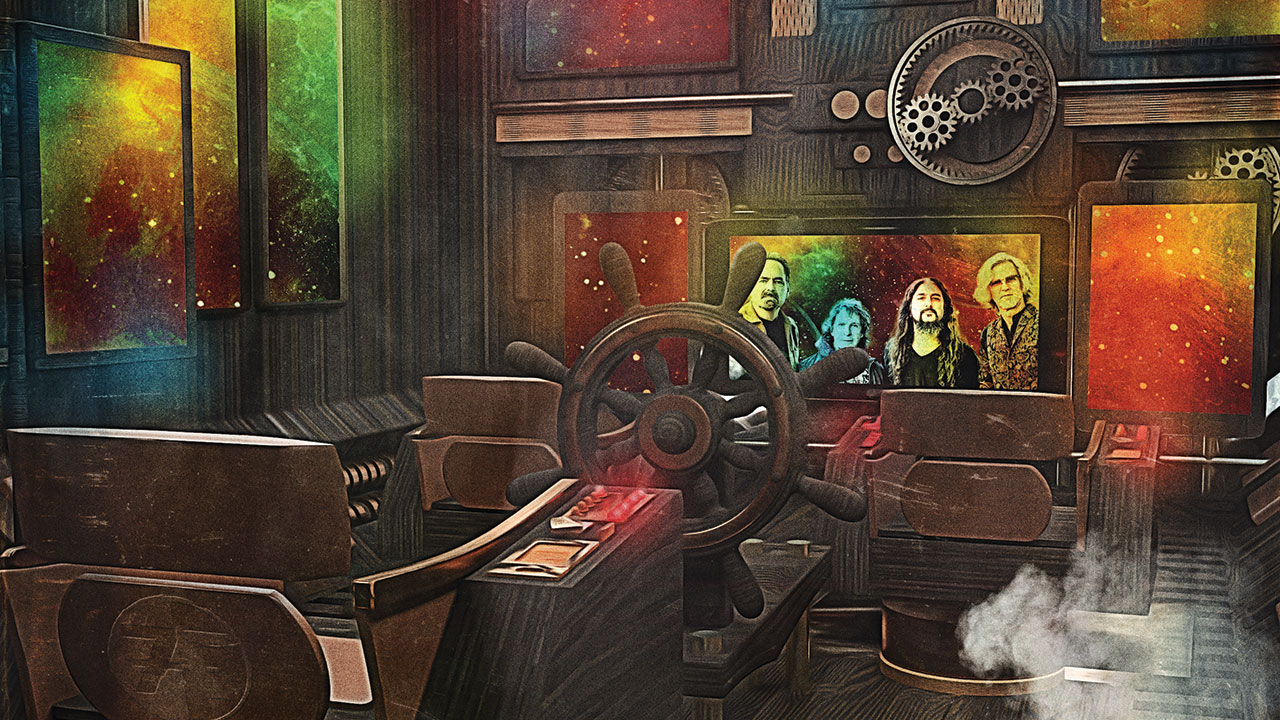"We have always had the attitude that more of anything is never enough,” asserts Transatlantic drummer Mike Portnoy, proudly. “But this time we have taken that idea to a new extreme.” And, boy, have they.
Transatlantic’s self-produced fifth album, The Absolute Universe was fleshed out in Sweden in late 2019. Then, as Portnoy, Neal Morse, Roine Stolt and Pete Trewavas worked on their parts in their respective studios, the music – says Stolt – kept “expanding and expanding”. Ultimately they settled on two variations on the same record: a 60-minute, single-disc ‘abridged’ version subtitled The Breath Of Life, and a 90-minute, double-disc ‘extended’ one, called Forevermore. The shorter isn’t an edit of the longer, because that’d be too straightforward. Instead, each is a fresh recording, with alternate compositional elements, lyrics, and songs. Between the two, what you get is, if not the best of both worlds, certainly the most of them.
Like the band’s 2009 comeback opus The Whirlwind, The Absolute Universe is one long, loosely conceptual piece split into separate tracks: a gargantuan, labyrinthine and majestic prog symphony that hits all the notes you’d expect of these seasoned hands.
The Breath Of Life, Overture ushers us in on a mysterious, cosmos-wide synth with ethereal guitar notes and some Star Trek-like string lines, the music taking a knotty turn as all four members lock into the groove and weave their magic. Stolt’s been busy with The Flower Kings of late and his guitar chops are sharp and solid throughout. Morse is on form too, be it on Hammond, Moog or Mellotron, and the ever undersung Trewavas’ bass bubbles and fizzes admirably. This horrible year must have been particularly hellish for the energy bomb that is Portnoy, and the force of his personality and virtuosic skill seem more pronounced now. His talent’s out of lockdown, and channelled like a laser.
Present and correct are the punch-the-air anthems (Reaching For The Sky, Can You Feel It) and the huge, layered choruses (as on the jubilant Higher Than The Morning, which wears its 11/8–12/8 metre with consummate ease). Morse takes most vocal lines as per usual, and his acoustic guitar-led Take Now My Soul is imbued with his signature Christian rock feel with the lyrics: ‘Carry me through Lord, I’m comin’ home’. Elsewhere on the album Stolt gives a moody read of the Deep Purple-ish Owl Howl and strident The Darkness In The Light, which he adorns with some beautifully jazzy, Arabian-flavoured licks. Ever the subtly fantastic foil, bassist Trewavas’ functional-yet-likeable vocal sells the minor-key piano flourishes of Solitude, and Portnoy’s gravelly tones suit the deliciously sleazy riff of Looking For The Light.
The musicians have long sublimated their influences – Genesis, Yes, ELO, Queen, Floyd – to the point where they speak their heroes’ words with a voice and vocabulary all their own. Lyrically their metaphors remain traditional to the degree of simplistic, but these are a welcome astringent to their complex musical accompaniment. The tone and magnitude of latter day Transatlantic music arguably lacks some of the light and shade of earlier works like SMPTe and Bridge Across Forever, and at times this one feels almost like a test of resilience, of fealty. When transcendent closer Love Made A Way finally ebbs away, the listener has had a lot of bang for their Transatlantic buck. Ironically the longer version of the album is the superior listen.
You’d have to A/B both albums to compare and capture all the differing elements. For example, the Forevermore cut of Overture is augmented with vocals, has more space between orchestral peaks and more meat to its proggier passages. Reaching For The Sky becomes Heart Like A Whirlwind, with a completely new set of lyrics and extra passages, and Take Now My Soul is retooled as Swing High Swing Low. It’s the extra tracks that make the real difference. Bully is the band in full, frenetic instrumental flight, and Rainbow Sky and Sun Comes Up Today are hugely enjoyable, 70s inflected pop-rockers. Once you’ve heard these, you miss them on the shorter iteration of the album.
The view from the cockpit of the Transatlantic mothership remains clear: more is more, bigger is better, longer is stronger. Their proven, bountiful chemistry has allowed them to produce something as monolithic as The Absolute Universe… and twice. But while having an ‘All But The Kitchen Sink’ and ‘Kitchen Sink ‘N’ All’ version makes for an opulent artistic statement, here’s a hangnail of a thought: could an objective producer have helped them see the wood for the trees, make choices, and fashion the one great album currently residing inside two very good ones?

